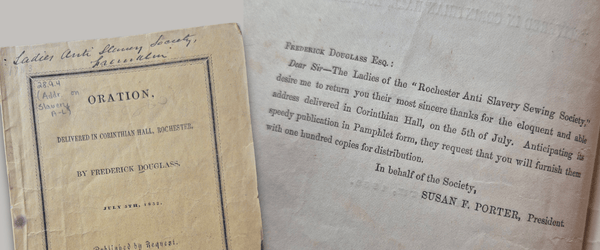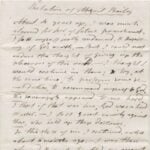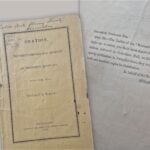Frederick Douglass’ “What to the Slave is the 4th of July” at the CLA
- Meaghan Wright
- February 10, 2025

Meaghan Wright, CLA Librarian
Last summer, our library intern Justin Brown-Ramsey informed staff that the copy of Frederick Douglass’ “What to the Slave is the Fourth of July?” speech in our collection was a first edition. This was a bit surprising to us; how did we not realize we had the earliest edition of this important work?
As it turns out, the information in the item’s catalog record was sparse. The original published title of Douglass’ speech was an “Oration delivered in Corinthian Hall, Rochester, by Frederick Douglass, July 5th, 1852.” Only later did it become more widely known as Douglass’ “What to the Slave is the Fourth of July?” speech. A researcher would need to know where and when this famous speech was given to catch that it was one and the same, although the subject heading “Fourth of July orations” was a helpful clue.
The catalog record has since been updated with more information to help researchers (and staff) understand the context of this important pamphlet. Follow the link below to learn more about the fascinating history of Douglass’ speech.
Where did the speech’s better-known title come from? This initial pamphlet was published by the request of the Ladies of the Rochester Anti-Slavery Sewing Society, who wanted 100 copies printed for distribution.
Three years later, Douglass published his second autobiography, My Bondage and My Freedom. Here, his Rochester speech was reprinted in the appendix under the name “What to the slave is the Fourth of July?” and the speech has since been known by that title. (The CLA holds a 1994 edition of the autobiography.)
It might surprise some people that Douglass’ line in the speech is actually, “What, to the American slave, is your Fourth of July?”
This grammatical difference is in fact a central theme of Douglass’ speech, as he asks “Fellow-citizens […] why am I called upon to speak here to-day? What have I, or those I represent, to do with your national independence?” This dissonance and hypocrisy inherent in the holiday are too glaring to look past, as he declares that, “This Fourth of July is yours, not mine. You may rejoice, I must mourn. To drag a man in fetters into the grand illuminated temple of liberty, and call upon him to join you in joyous anthems, were inhuman mockery and sacrilegious irony.”
Douglass also confronts the majority of churches in America for upholding slavery, which “is guilty, when viewed in connection with what it is doing to uphold slavery; but it is superlatively guilty when viewed in connection with its ability to abolish slavery.” He contrasted this with the contribution of British churches to eliminate slavery in much of the British empire.
Douglass’ speech can be a cutting indictment of the horrors of slavery and the failure the country to live up to its ideals, but it does end on a hopeful note: “notwithstanding the dark picture I have this day presented, of the state of the nation, I do not despair of this country. There are forces in operation, which must inevitably, work the downfall of slavery. ‘The arm of the Lord is not shortened,’ and the doom of slavery is certain.”
We highly recommend you take the time to read Douglass’ full speech, which is available online at the Internet Archive.





